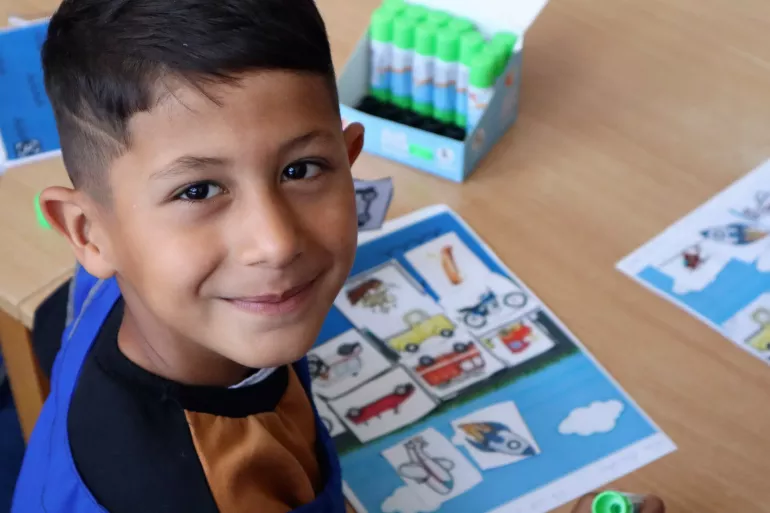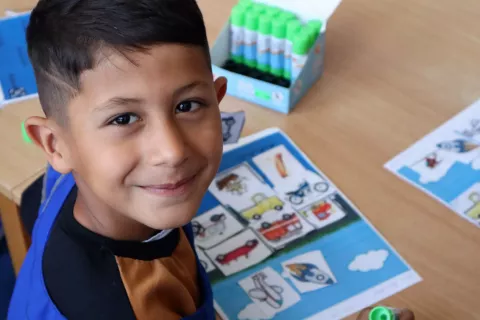Children from Roma communities in Europe face high levels of deprivation – UNICEF
At least three-quarters of children from Roma communities in Kosovo*, Montenegro and Serbia do not have adequate housing, according to a new UNICEF report

GENEVA, 15 April 2024 – Children from Roma communities in four European countries and territories face a myriad of deprivation, according to a new report published today by UNICEF.
Breaking barriers: An analytical report on Roma children and women in Kosovo, Montenegro, North Macedonia and Serbia notes that children from Roma communities have low immunization coverage, and lower preschool and school attendance and completion rates compared to national averages.
At least three-quarters of Roma children live in dwellings classified as damp, dark, leaking or rotten, or dwellings without access to a toilet or shower. In Kosovo, around 85 per cent of children living in Roma settlements live in inadequate housing.
“Starting at birth, children from Roma communities continue to be systematically deprived of their basic rights. Limited access to education, health care and adequate living conditions are putting children’s health and well-being at risk,” said Regina De Dominicis, UNICEF Regional Director for Europe and Central Asia.
“Concerted action from governments to create inclusive health, education and social systems, and investment are critical to ending longstanding inequities experienced by children from Roma communities across Europe."
Less than half of children aged 24–35 months from Roma, Ashkali, and Egyptian communities in Kosovo have been fully immunized, compared to three-quarters of children overall. The report also notes a decrease in vaccination rates among children in Roma communities in North Macedonia.
Across all four countries and territories featured in the report, children from Roma communities are less likely to go to school, be retained in school and reach minimum proficiencies in reading and numeracy skills when compared to children from non-Roma communities.
The report notes that early education can enhance children’s readiness for primary school. For example, in Kosovo, attendance to first grade of primary school among children from Roma, Ashkali and Egyptian communities who attended an early childhood education programme during the previous year increased from 54 per cent in 2013 to 73 per cent in 2019. In Montenegro, an increase from 24 per cent in 2013 to 45 per cent in 2018 is noted.
Despite deprivations persisting among Roma communities, there has been some progress in recent years. While women from Roma communities still lack sufficient antenatal and postnatal care, there has been an increase in better care for mothers during childbirth. There has also been an increase in birth registration of children under-five and an increase in access to health insurance among children. Improvements in access to schooling, electricity, safe water and social cash transfers are also noted in the report.
UNICEF commends the commitment made by governments across the four countries and territories featured in the report to collect data on children from Roma communities as it provides a snapshot into the deprivations faced by Roma children across the entire region.
The report features a series of recommendations on key policy choices needed to address disparities and ensure access to universal services, all of which rely on collaborative actions from governments, international organizations and civil society. Recommendations range from increasing the availability of disaggregated data; to cash assistance; to systematic inclusion of Roma mediators in the health-care system and supporting health-care coverage for Roma individuals without documents, particularly for vaccination; to strengthening national education systems and raising awareness among parents of the importance of education.
UNICEF works across Europe to support children and families from Roma communities. This includes providing critical child protection, social protection, health, and early childhood development services, including cash transfers, education opportunities, and home visiting programmes.
###
Notes to editors
The report presents secondary data analysis and compares published survey data, accessible via www.mics.unicef.org.
Media contacts
About UNICEF
UNICEF promotes the rights and wellbeing of every child, in everything we do. Together with our partners, we work in 190 countries and territories to translate that commitment into practical action, focusing special effort on reaching the most vulnerable and excluded children, to the benefit of all children, everywhere.
For more information about UNICEF and its work for children, visit www.unicef.org.

